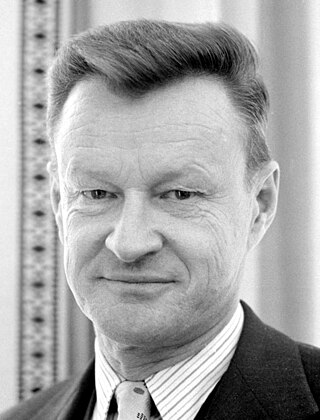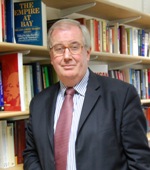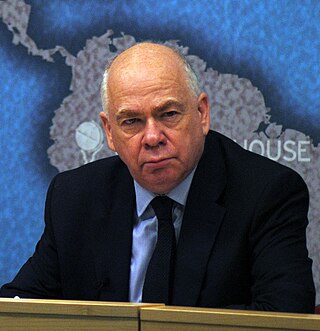
Zbigniew Kazimierz Brzeziński, known as Zbig, was a Polish-American diplomat and political scientist. He served as a counselor to President Lyndon B. Johnson from 1966 to 1968 and was President Jimmy Carter's National Security Advisor from 1977 to 1981. As a scholar, Brzezinski belonged to the realist school of international relations, standing in the geopolitical tradition of Halford Mackinder and Nicholas J. Spykman, while elements of liberal idealism have also been identified in his outlook. Brzezinski was the primary organizer of The Trilateral Commission.

Cyrus Roberts Vance Sr. was an American lawyer and United States Secretary of State under President Jimmy Carter from 1977 to 1980. Prior to serving in that position, he was the United States Deputy Secretary of Defense in the Johnson administration. During the Kennedy administration he was Secretary of the Army and General Counsel of the Department of Defense.

The Iran hostage crisis was a diplomatic standoff between the United States and Iran. Fifty-two American diplomats and citizens were held hostage after a group of militarized Iranian college students belonging to the Muslim Student Followers of the Imam's Line, who supported the Iranian Revolution, took over the U.S. Embassy in Tehran and took them as hostages. The hostages were held for 444 days, from November 4, 1979 to their release on January 20, 1981. The crisis is considered a pivotal episode in the history of Iran–United States relations.

David Maxim Triesman, Baron Triesman is a British politician, merchant banker and former trade union leader.

David W. Harvey is a British Marxist economic geographer, podcaster, and Distinguished Professor of anthropology and geography at the Graduate Center of the City University of New York (CUNY). He received his PhD in geography from the University of Cambridge in 1961. Harvey has authored many books and essays that have been prominent in the development of modern geography as a discipline. He is a proponent of the idea of the right to the city.

Graham Tillett Allison Jr. is an American political scientist and the Douglas Dillon Professor of Government at the John F. Kennedy School of Government at Harvard University. He is known for his contributions in the late 1960s and early 1970s to the bureaucratic analysis of decision making, especially during times of crisis. His book Remaking Foreign Policy: The Organizational Connection, co-written with Peter Szanton, was published in 1976 and influenced the foreign policy of the Carter administration. Since the 1970s, Allison has also been a leading analyst of U.S. national security and defense policy, with a special interest in nuclear weapons and terrorism.
Nikolas Kirrill Gvosdev is a Russian–American international relations scholar. He is currently professor of national security studies at the U.S. Naval War College and the former Editor of the bi-monthly foreign policy journal, The National Interest. He writes as a specialist on US foreign policy as well as international politics as they affect Russia and its neighbors. He currently serves as editor of the journal Orbis.

Andrew Lambert is a British naval historian, who since 2001 has been the Laughton Professor of Naval History in the Department of War Studies, King's College London.

Richard Sakwa is a British political scientist and a former professor of Russian and European politics at the University of Kent, a senior research fellow at the National Research University-Higher School of Economics in Moscow, and an honorary professor in the Faculty of Political Science at Moscow State University. He has written books about Russian, Central and Eastern European communist and post-communist politics.
Jeremy Black is a British historian, writer, and former professor of history at the University of Exeter. He is a senior fellow at the Center for the Study of America and the West at the Foreign Policy Research Institute in Philadelphia, Pennsylvania, US.

Michael E. Cox is a British academic and international relations scholar. He is currently Emeritus Professor of International Relations at the London School of Economics (LSE) and Director of LSE IDEAS. He also teaches for the TRIUM Global Executive MBA Program, an alliance of NYU Stern and the London School of Economics and HEC School of Management.
The Algiers Accords of January 19, 1981 was a set of obligations and commitments undertaken independently by the United States and Iran to resolve the Iran hostage crisis, brokered by the Algerian government and signed in Algiers on January 19, 1981. The crisis began from the takeover of the American embassy in Tehran on November 4, 1979, where Iranian students took hostage of present American embassy staff. By this accord and its adherence, 52 American citizens were able to leave Iran. With the two countries unable to settle on mutually agreeable terms, particularly for quantitative financial obligations, Algerian mediators proposed an alternative agreement model - one where each country undertook obligations under the accords independently, rather than requiring both countries to mutually adhere to the same terms under a bilateral agreement.

United States foreign policy in the Middle East has its roots in the 19th-century Barbary Wars that occurred shortly after the 1776 establishment of the United States as an independent sovereign state, but became much more expansive in the aftermath of World War II. With the goal of preventing the Soviet Union from gaining influence in the region during the Cold War, American foreign policy saw the deliverance of extensive support in various forms to anti-communist and anti-Soviet regimes; among the top priorities for the U.S. with regards to this goal was its support for the State of Israel against its Soviet-backed neighbouring Arab countries during the peak of the Arab–Israeli conflict. The U.S. also came to replace the United Kingdom as the main security patron for Saudi Arabia as well as the other Arab states of the Persian Gulf in the 1960s and 1970s in order to ensure, among other goals, a stable flow of oil from the Persian Gulf. As of 2023, the U.S. has diplomatic relations with every country in the Middle East except for Iran, with whom relations were severed after the 1979 Islamic Revolution, and Syria, with whom relations were suspended in 2012 following the outbreak of the Syrian Civil War.

Sir Lawrence David Freedman, is a British academic, historian and author specialising in foreign policy, international relations and strategy. He has been described as the "dean of British strategic studies" and was a member of the Iraq Inquiry. He is an Emeritus Professor of War Studies at King's College London.

Diane Rosemary Elson is a British economist, sociologist and gender and development social scientist. She is Professor Emerita of sociology at the University of Essex and a former professor of development studies at the University of Manchester.

Professor Alex Mintz, Director of the Computerized Decision Making Lab, and former Provost of IDC Herzliya, is a professor for decision-making in government, and former President of the Israeli Political Science Association.
A constitutional referendum was held in Iran on 2 and 3 December 1979. The new Islamic constitution was approved by 99.5% of voters.

Anthony William Forster, FRSA FAcSS FHEA is a British political scientist and former British Army officer. He is the current vice-chancellor of the University of Essex and was previously deputy vice-chancellor of Durham University.
Charles Frazer Hermann holds the Brent Scowcroft Chair in International Policy Studies at the George Bush School of Government and Public Service at Texas A&M University. He is an expert in matters relating to American foreign policy, crisis management, and decision-making.
Ian Budge is a political scientist who has pioneered the use of quantitative methods in studying party democracy across countries. Currently Emeritus Professor of the Department of Government, University of Essex he has been Professor at the European University Institute, Florence (1982-5). and visiting professor at various institutions in five other countries.













